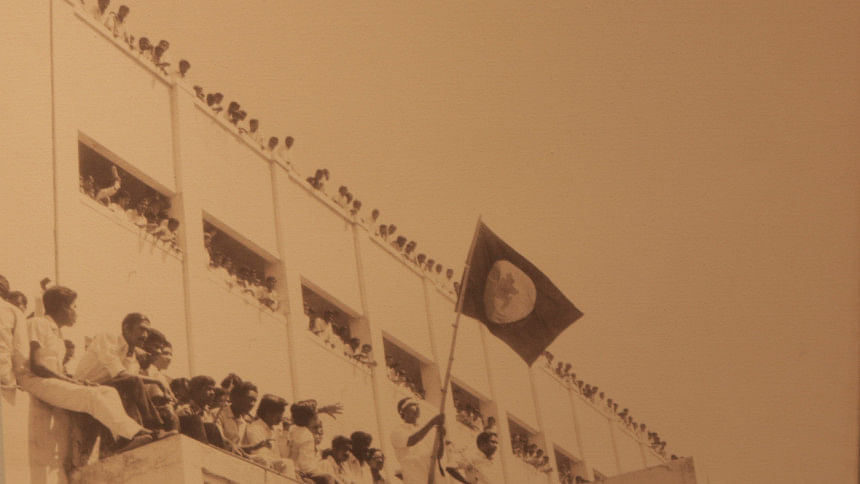Bangladesh flag hoisted at Dhaka University

March 2, 1971
BANGLADESH FLAG HOISTED
In a historic student rally held at Dhaka University premises, the first Bangladesh flag was hoisted. The flag was dark green with a red sphere in the centre on which the outline of East Pakistan map was superimposed. It was unfurled by student leader ASM Abdur Rab on the rooftop of the western porch of the Arts Faculty of Dhaka University in front of hundreds of students and people. Saluting the flag, they all expressed their solidarity with the movement for liberation.
In the afternoon, the Pakistani flag was pulled down and the new flag was hoisted at Dhaka University and on the secretariat premises.
'IF BANGLADESH IS A FIRE … THEY WILL NOT BE ABLE TO ESCAPE THE FLAMES'
Bangabandhu Sheikh Mujibur Rahman in a press statement issued in the evening of March 2, 1971, strongly condemned the killing of unarmed persons at Farmgate and urged the government to desist forthwith from this reckless course. He reminded that Bangalees could not be suppressed anymore and they would no longer tolerate exploitation as a colony or as a market.
"They should be reminded that firing upon unarmed masses amounts to genocide and is a crime against humanity. They should know that if Bangladesh is a fire, as it will be if such confrontation continues, then they will not be able to escape the flames," added Bangabandhu.
Bangabandhu, as a directive, called for a province-wide hartal from March 3 to 6 from 6:00am to 2:00pm in all spheres including government offices, secretariat, High Court and other courts, semi-government and autonomous corporations, PIA, Railways and other communication services, transport -- private and public -- and all mills, factories, industrial and commercial establishments and markets. Exemptions are to be extended to ambulances, press cars, hospitals, medicine shops, electric and water supply services. Tajuddin Ahmad was entrusted with the task of formulating the directives.
Archer K Blood, then American Consul General in Dhaka, assessed the situation as: "It seemed to us that the Sheikh [Mujib] was trying to walk a slippery path. On the one hand he was trying to maintain his leadership and keep the initiative by calling for an end to martial law and a continuation of the struggle. One the other hand he was seeking to cool the crowds so as to avoid a tightening of military control." [Archer K Blood, The Cruel Birth of Bangladesh, UPL, 2006, pg. 162]
'PPP HAS NEVER REJECTED 6 POINTS'
In a press conference held in Karachi on March 2, 1971, Zulfikar Ali Bhutto claimed his party had consistently endeavoured to go as close to the six-point demands of the Awami League.
"We did not demand a strong centre but only a federal centre that would have the character of keeping the country united federal state. We further manifested our 'bona fides' by mass mobilisation of public opinion in West Pakistan in favour of a constitution as close to the Six Points formula as possible," he added.
Regarding the postponement of the National Assembly session, Bhutto said, "We demanded postponement of the National Assembly session only to provide the two major parties with an opportunity to have another dialogue. We are willing to have this dialogue anywhere at any time that the Awami League would like. If the Awami League fails to reciprocate, the onus for the consequences will not be on us."
SEARCH FOR A POLITICAL SOLUTION
In search of a political solution to the situation created in East Pakistan after the sine die postponement of the National Assembly, Yahya Khan and Bhutto, accompanied by several of their key advisers, held a discussion on March 2, 1971. The goal was to find an institutional forum, short of a meeting of the National Assembly, that would be conducive to forge a political solution. Bhutto agreed to participate in a roundtable conference of all parties represented in the National Assembly. They planned for such a meeting so that they could face Awami League in situation that would be morally, though not legally, binding. [Richard Sisson and Leo E Rose, War and Secession: Pakistan, India, and the Creation of Bangladesh, UCP, 1990, pg. 96]
CURFEW IMPOSED IN DHAKA CITY
At about 7:30 pm the imposition of curfew in Dhaka city, from 9:00pm to 8:00am the following morning, was announced through radio. Subsequently, the Martial Law Administrator (MLA) announced that the curfew would continue on a daily basis from 7:00pm to 7:00am until calm was restored.
As soon as the announcement of the curfew was made, students came out of their hostels and general people of their houses and formed processions, chanting slogans to oppose it. Their slogans "Sandhya ain mani na", "Joy Bangla", "Bir Bangali osthro dhoro, Bangladesh shadhin koro" echoed throughout the city. The curfew was broken and barricades were formed.
In front of Morning News newspaper office at DIT intersection, the military opened fire on people at around 9:30pm. When another procession of people broke the curfew and headed towards the Governor's House, they also became targets of bullets.
Shamsuddoza Sajen is a journalist and researcher. He can be contacted at [email protected]

 For all latest news, follow The Daily Star's Google News channel.
For all latest news, follow The Daily Star's Google News channel. 




Comments